
The Australian Liberal Party finds itself at a critical crossroads, grappling with an internal ideological struggle that threatens to redefine its identity and electoral viability. At the centre of this political storm stands Senator Jacinta Nampijinpa Price, whose controversial positions on Indigenous affairs have ignited both fervent support and significant opposition within party ranks.
The Rising Conservative Voice
Senator Price has emerged as a formidable conservative voice, challenging what she perceives as orthodoxies within Indigenous policy debates. Her straightforward approach to complex issues has resonated with certain segments of the party base, particularly those advocating for a more assertive conservative direction following recent electoral setbacks.
Internal Party Tensions
Behind closed doors, senior Liberal figures are increasingly concerned about the direction Price represents. The division reflects a broader existential crisis within the party as it attempts to balance traditional conservative values with the need to appeal to a changing Australian electorate. This tension has created factions that disagree fundamentally on how the party should approach Indigenous recognition and reconciliation.
Electoral Implications
The internal conflict surrounding Senator Price's platform carries significant electoral consequences. While her stance energises the conservative base, it risks alienating moderate voters in urban seats that the Liberals must win to return to government. Party strategists are carefully weighing the benefits of a more assertive conservative identity against the potential electoral costs in key marginal constituencies.
The Path Forward
The Liberal Party now faces a delicate balancing act. It must either embrace Senator Price's vision of conservatism or risk alienating its base by moderating its position on Indigenous affairs. This decision will likely shape the party's direction for years to come and determine its ability to present a united front to the Australian electorate.
The ongoing saga represents more than just personality politics—it signals a fundamental debate about the soul of Australian conservatism and how it responds to the nation's evolving social landscape.





